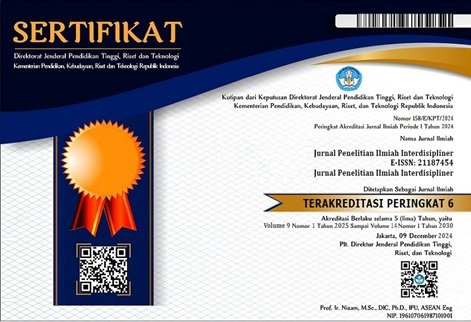PENGARUH OPTIMALISASI POTENSI DESA WISATA DI BANYUMAS DALAM MENINGKATKAN PEREKONOMIAN DI DESA PEKUNDEN
Kata Kunci:
Desa Wisata, Potensi Lokal, Ekonomi Masyarakat, Pengelolaan Wisata, PekundenAbstrak
Penelitian ini bertujuan untuk menganalisis pengaruh optimalisasi potensi desa wisata terhadap peningkatan perekonomian masyarakat di Desa Pekunden, Kecamatan Banyumas, Kabupaten Banyumas. Desa ini memiliki 13 objek wisata berbasis edukasi dan kearifan lokal yang dikelola oleh masyarakat melalui Pokdarwis “Wisanggeni”. Penelitian ini menggunakan pendekatan kuantitatif deskriptif dengan metode survei melalui kuesioner Google Form yang disebarkan kepada 38 responden yang merupakan warga Desa Pekunden. Data dianalisis menggunakan statistik deskriptif dan regresi linier berganda. Hasil penelitian menunjukkan bahwa optimalisasi potensi desa wisata berpengaruh signifikan terhadap peningkatan perekonomian masyarakat, dengan nilai koefisien determinasi (R²) sebesar 0,615 dan nilai signifikansi (p) sebesar 0,000. Secara parsial, variabel pengetahuan masyarakat tentang potensi wisata, kualitas pengelolaan, dan dukungan pemerintah desa memiliki pengaruh signifikan. Sementara itu, keterlibatan dan partisipasi warga meskipun tidak signifikan secara statistik, tetap menunjukkan peran penting dalam keberlanjutan program wisata. Penelitian ini menyimpulkan bahwa desa wisata dapat menjadi instrumen strategis dalam pemberdayaan ekonomi lokal jika dikelola secara optimal, partisipatif, dan didukung oleh kebijakan pemerintah desa yang progresif. Implikasi praktis dari penelitian ini mendorong peran aktif masyarakat, profesionalisme Pokdarwis, serta sinergi lintas sektor dalam mengembangkan desa wisata yang berdaya saing dan berkelanjutan.
This study aims to analyze the influence of optimizing tourism village potential on improving the local economy of Pekunden Village, Banyumas Regency, Central Java. The village offers 13 tourism attractions based on local wisdom and education, managed by the community through the Pokdarwis “Wisanggeni”. A descriptive quantitative approach was applied using survey methods through a Google Form questionnaire, with 38 local residents participating as respondents.The data were analyzed using descriptive statistics and multiple linear regression. The results showed that the optimization of tourism potential significantly affects the improvement of the village economy, with a determination coefficient (R²) of 0.615 and a significance value (p) of 0.000. Partially, variables such as knowledge of tourism potential, quality of management, and village government support showed a significant effect. Although community involvement and participation were not statistically significant, they still played an essential role in the sustainability of tourism programs. The study concludes that a tourism village can serve as a strategic instrument for empowering local economies when managed optimally, with community participation and supportive government policies. Practical implications suggest strengthening the role of the community, improving Pokdarwis professionalism, and enhancing cross-sector collaboration to develop a sustainable and competitive tourism village.





